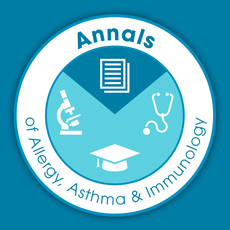
 Our Annual Scientific Meeting will soon be upon us. I hope many of you will be in attendance for what promises to be a unique, fun meeting. You can still register online 24/7 (even during the meeting) or in person at the Washington State Convention Center in Seattle. But if you can’t travel this year, consider streaming key sessions from the meeting with our Virtual Meeting instead! Our new November issue of Annals of Allergy, Asthma and Immunology focuses on a very important topic – penicillin allergy and how it can impact our patients and our practice. We have multiple features that should be most interesting to you, the practicing clinician, whether you are community or academic-based. I call your attention to two articles in particular that address this most important topic.
Our Annual Scientific Meeting will soon be upon us. I hope many of you will be in attendance for what promises to be a unique, fun meeting. You can still register online 24/7 (even during the meeting) or in person at the Washington State Convention Center in Seattle. But if you can’t travel this year, consider streaming key sessions from the meeting with our Virtual Meeting instead! Our new November issue of Annals of Allergy, Asthma and Immunology focuses on a very important topic – penicillin allergy and how it can impact our patients and our practice. We have multiple features that should be most interesting to you, the practicing clinician, whether you are community or academic-based. I call your attention to two articles in particular that address this most important topic.
The first is a CME review authored by Eric Macy, MD, MS, FACAAI, and David Vyles, DO, MS, that examines the evidence of who really needs penicillin testing. We have all had patients who were told they had a penicillin allergy as a child because of a headache or episode of diarrhea days into therapy versus a patient with a history of receiving a dose of penicillin (or derivative) and 15 minutes later breaking out in hives followed by dizziness and dyspnea. Those two extremes are fairly straightforward in their evaluation and management. But what about a less clear history? This article provides excellent rationale and recommendations on who should be tested, the extent of the testing including use of minor determinants and oral challenge and therapeutic directions based upon the results of testing or challenge.
Another interesting and useful article is by N. Franklin Adkinson Jr., MD, Louis Mendelson, MD, FACAAI, and colleagues who review penicillin minor determinants. We all know that the term “minor” can be misleading in terms of importance in reaction severity of sensitive patients. The authors make an evidence-based case for the use of minor determinants in comprehensive penicillin testing for high-suspicion penicillin allergic patients and, in particular, the negative predictive value of the procedure.
The perspectives of these two articles are distinct but both are evidence-based. Accordingly, each reader can use these two highly evidence-based articles to evaluate their own attitudes and practices in approach to the putative penicillin allergic patient. This will be a topic of conversation at our upcoming Annual Meeting and beyond. See you in Seattle!
Gailen D. Marshall Jr., MD, PhD, FACAAI
Editor-in-chief

